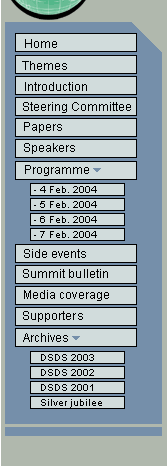
|
4 February
(at India Habitat Centre, Lodhi Road,
New Delhi) |
Summit
bulletin
 |
|
| Highlights of the Inaugural Session |
 |
Left
to right: Dr R K Pachauri, Director-General, TERI; Ms Rejoice
Mabudafhasi, Hon'ble Deputy Minister for Environmental Affairs
and Tourism, South Africa; Prof. Klaus Töpfer, Executive
Director, United Nations Environment Programme, Nairobi;
Mr Yashwant Sinha, Hon’ble Minister for External Affairs,
Government of India, New Delhi; Dr Arcot Ramachandran, Chairman,
TERI, New Delhi; Dr Prodipto Ghosh, Secretary, Ministry of Environment
and Forests, Government of India, New Delhi;
Prof. Jeffrey D Sachs, Special Advisor to the Secretary-General
of the United Nations, New York |
| |
|
 Mr Yashwant Sinha
Mr Yashwant Sinha
Hon’ble Minister for External Affairs,
Government of India, New Delhi
'Developing countries such as India have voluntarily sacrificed
the easier option of developmentalism, which provided a popular
path to the quick prosperity of the First World, and opted for
alternatives that are responsible and accountable to present
and future generations. This was not an easy choice.'
|
| |
|
|
 Ms Rejoice Mabudafhasi
Ms Rejoice Mabudafhasi
Hon'ble Deputy Minister for Environmental Affairs
and Tourism, South Africa
'I draw my inspiration to work for sustainable development from
DSDS.'
|
|
| |
|
|
|
 Prof. Klaus Töpfer
Prof. Klaus Töpfer
Executive Director, United Nations Environment
Programme, Nairobi
'As long as the richest 20% of the world's population
continues to account for 86% of total personal consumption expenditure,
it is unlikely that the poor will meet their aspirations of
sustainable development.' |
| |
|
|
 Prof.
Jeffrey D Sachs
Prof.
Jeffrey D Sachs
Special Advisor to the Secretary-General of the
United Nations, New York
'India has a special role to play in removing
poverty in this generation and in a sustainable manner. India
is the largest democracy in the world. Its voice will be central
to this goal. A negative side is that India is home to a quarter
of a billion of poor people… Without the voice of India,
South Africa, Brazil, and democracies of the developing economies,
the international agenda is bound to remain skewed.' |
|
| |
|
|
|
 Dr
Prodipto Ghosh (speaking on behalf of Mr Ramesh Bais)
Dr
Prodipto Ghosh (speaking on behalf of Mr Ramesh Bais)
Secretary, Ministry of Environment and Forests,
Government of India
'Poverty cannot be removed and, in turn, the
WEHAB agenda cannot be achieved on a sustainable basis, unless
local communities are empowered.' |
| |
|
|
 Dr
Arcot Ramachandran
Dr
Arcot Ramachandran
Chairman, TERI, New Delhi
'The importance of the WEHAB (water and sanitation, energy,
health, agriculture, biodiversity) framework, as enunciated
by the UN Secretary-General, lies at the core of the concept
and practice of sustainable development.' |
|
| |
|
| |
|
 Dr
R K Pachauri
Dr
R K Pachauri
Director-General, TERI, New Delhi and Chairman,
Intergovernmental Panel on Climate Change, Geneva |
|
|



